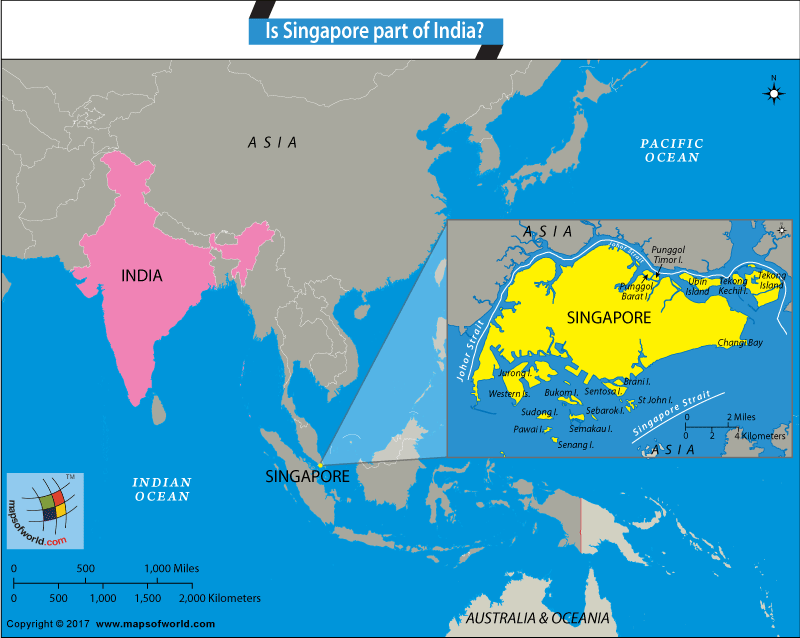Is Singapore a Part of India?
No, Singapore is not part of India. Officially called the Republic of Singapore, it is an independent and sovereign nation and is located in Southeast Asia. It’s a city-state with Singapore as its capital.
Covering a total area of 269 sq. miles (land and water), Singapore comprises one main island – Pulau Ujong and 60 smaller islands. Singapore City is located just north of the equator at Latitude 1°21’ N and Longitude 103° 49’ E, with Malaysia on its northern side and Indonesia to its south. At 545 feet, the highest point is Bukit Timah Hill and the lowest is the Strait of Singapore.
The country is surrounded by the Strait of Singapore and Johore Strait, with a coastline extending 120 miles. Apart from the main island, there are four other large islands; Jurong Island, Pulau Tekong, Sentosa, and Pulau Ubin.
Singapore has built access by land across the straits with Malaysia at two Points – Johore-Singapore Causeway and the Tuas Second Link.
People and Economy:
The Republic of Singapore is a developed economy with a population of 5,607,300 (2016 est). People of Chinese origin (78%) dominate, followed by Malay 13.9%, Indian 7.9%, and Others 1.4%.
The country has four official languages – Mandarin (35%), English (22.9%), Malay (14%), and Tamil (3.2%). Other languages spoken include Hokkien (11.5%), Cantonese (5.8%), Teochew (4.9%), other Chinese (1.8%), and Others (0.9%).
Popular religions followed include Buddhist (42.6%), Muslim (14.8%), Taoist (8.4%), Hindu (4.1%), Catholic (4.9%), other Christian (9.9%), Other (0.7%), none (14.8%).
Its main currency is the Singapore Dollar. In 2016, Singapore recorded a GDP of USD 296.58 billion; a per capita GDP of USD 52,894.43.
The country remains one of the most preferred locations for work and residence. In 2016, the total number of visitors to Singapore was 16,403,600, excluding those visiting from Malaysia by land.
Singapore remains a major shipping and transit destination for sea and air-based trade. The Port of Singapore is the 2nd busiest port in the world. In 2016, the country handled 593,296,700 tons of sea cargo; 30,903,600 TEUs (Twenty Foot Equivalent Units) of containers; 1,969,434 tons of air cargo.
The emergence of Singapore:
In 1826, the British East India Company signed the Straits of Settlements under which Singapore was administratively placed together with Malacca and Penang. By April 1867, the British dissolved the Straits of Settlements in favor of separate colonies under British rule. Singapore was strategically important as a naval base and trading outpost for the British.
In 1939, the British built the largest dry dock in the world at Singapore. However, during World War II, the British had to surrender Singapore to the Japanese.
On 16 September 1963, Singapore joined Malaya, North Borneo, and Sarawak to form the Malaysian Federation. On 9 August 1965, Singapore separated from Malaysia to become an independent Republic. The country transformed itself into one of the four Asian Tigers under the leadership of its dynamic leader, Lee Kuan Yew.
Related Links:
Related Maps:





